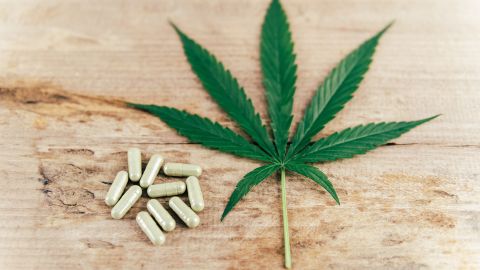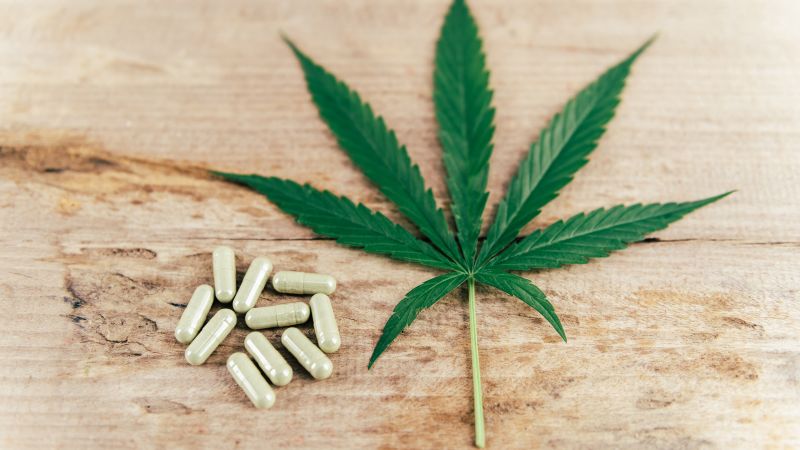CNN
—
Some people suffering pain from cancer and other chronic diseases turn to marijuana to ease their suffering, but much of that relief may come from simply believing weed will help, a new study found.
In research, the tendency to have positive expectations that a dummy pill, procedure or treatment will help is called the placebo effect.
“The placebo response amounted to 67% of the pain relief associated with genuine cannabinoids,” said lead author Karin Jensen, an associate professor and research group leader in the pain neuroimaging lab at the Karolinska Institutet in the Stockholm area.
“Factors such as patients’ expectations of relief are likely to play a role in the analgesic effects associated with cannabis-based treatments,” Jensen said in an email.
The results of the recent study, published November 28 in the journal JAMA Network Open, echo those of another large 2021 analysis of the available evidence by the International Association for the Study of Pain. Based on those findings, the association issued a statement against the use of marijuana for pain.
“There is not enough high-quality human clinical safety and efficacy evidence to allow IASP to endorse the general use of cannabis and cannabinoids for pain at this time,” the association said at the time.
A 2020 study, for example, found using marijuana before entering the hospital for a surgical procedure made pain during recovery significantly worse. People who used weed beforehand also needed more anesthesia during surgery, and undergoing anesthesia can be risky for some people, such as older adults or those with chronic illnesses such as diabetes. Marijuana users also needed more opioids during recovery.
Another 2020 analysis of six randomized control trials that included nearly 1,500 cancer patients in the United Kingdom and Europe found no change in average pain intensity between the people who used cannabis and those who took dummy pills. In the study, some cannabis users experienced side effects at times severe enough to cause dropout from the studies. Reported side effects included dizziness, nausea, vomiting, fatigue and sleepiness.
“I think we set up patients to expect a certain kind of outcome,” said experimental psychologist Harriet de Wit, a professor of psychiatry and behavioral science at the University of Chicago who studies the placebo effect.
“Without a doubt, some people are going to expect to get the active drug, and they’ll experience some of those positive outcomes. That’s true with antidepressants; it’s true with pain medications,” said de Wit, who was not involved in the new study on cannabis.
“It’s an interesting and very real phenomenon,” she added. “It’s certainly not ‘all in your head.’ And yet there are some brain circuits that are involved in creating those thoughts and those expectations.”
The sugar pill effect
The placebo effect was first discovered in the late 1700s. It soon became the basis of many of the horrifying treatments physicians of the time used, such as bleeding, blistering and leeching, to name a few mentioned in a 1990 journal article.
“The enormous power of the placebo helps explain why physicians continued to be useful, respected and highly honored members of society despite the painful, abhorrent, unscientific and often dangerous treatments they prescribed,” wrote author Charmane Eastman, founding director of the Biological Rhythms Research Laboratory at Rush University Medical Center in Chicago.
In modern clinical trials, researchers typically give the medication being tested to half of the study participants, while a so-called sugar pill goes to an equally matched group of people. Neither group is supposed to know which pill they received. If it’s a double-blind study, even the researchers don’t know which pill the participants swallowed.
But sometimes people can tell, if the pill produces an effect that might be felt, such as a marijuana high. And even if they can’t tell, people are known to believe that they did indeed get the experimental dose.
In fact, the optimistic attitude generated by a placebo can be powerful enough to affect study results dramatically. For example, the placebo effect can account for 50% to 75% of the positive results found in antidepressant drug trials, according to a 2002 study.
Partly to counter this effect, scientists do not consider a study’s results significant until they rise above chance.
Setting expectations
The new research examined 20 studies using cannabis for pain control in over 1,450 people between the ages of 33 and 62. All the studies were conducted as double-blind, placebo-controlled clinical trials — meaning that even the researchers did not know which study participant received cannabis or a dummy treatment.

Researchers found no difference in self-reported pain reduction between the use of weed or placebo in the clinical trials: Both showed a large improvement in pain. There was also no difference between length of treatment — 45 days or several months — both showed pain improvement.
In clinical trials where blinding was most successful — people had no idea which treatment they were getting — the placebo response was highest. Participants reported their pain to be moderate to significantly less intense after treatment with a placebo compared with before treatment.
A unique part of the study looked at the role of news and social media for the placebo effect in cannabis clinical trials, Jensen said. Researchers found positive media coverage after each of the cannabis clinical trials, even when the study results were less than spectacular, she said.
“The positive and extensive media attention may shape placebo responses in subsequent clinical trials, yet the current study is not powered to address this possibility,” the study said.
More research is needed to understand if this shaping of placebo responses actually happens, Jensen said.
“It’s really hard to say where people get their information of what they expect the drug will do,” de Wit said. “I don’t think you can explain the placebo effect or blame it on social media. But you could say that’s where they got the expectation that this drug would relieve their pain — there’s a lot of social media saying cannabis is good for everything under the sun.”
